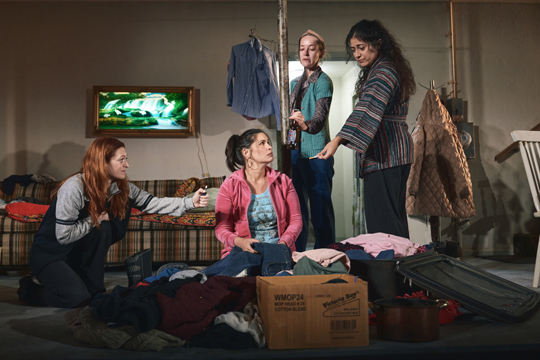By Alix Cohen
Though Queens takes place from 2001 to 2017, the phenomenon of immigrant women sharing overcrowded apartments as part of survival strategy more than likely exists today. Economic hardship, informal labor networks, and community ties send women on their own to neighborhoods outside Manhattan for affordable living arrangements and community succor.
Privacy was minimal: some slept in curtained-off corners or on mattresses in group spaces. Arrangements were often brokered through paradas (informal labor pickup spots), where women sought domestic work like cleaning or care giving. Women arrived with an address the most important part of minimal luggage. A portion of earnings were most often sent home.
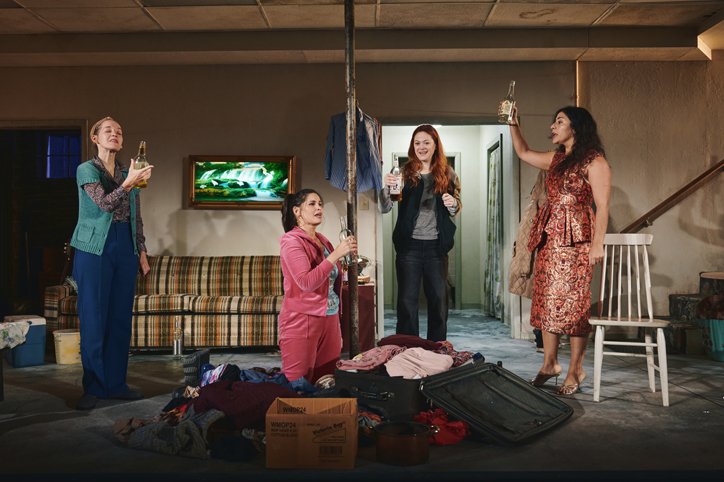
Brooke Bloom (Pelagiya) , Nicole Villamil (Isabela), Marin Ireland (Renia), Nadine Malouf (Aamani)
Marsha Ginsberg’s basement Set is vividly minimal/poor. Every item of furniture and prop appears old, worn, and cheap. A single, fold-up bed is visible. Others ostensibly exist behind curtained doorways. Stairs lead to main floors where an elderly landlady lives.
Polish immigrant Renia (Marin Ireland) is returning to a shared apartment when literally accosted by newly arrived Ukrainian, Inna (Julia Lester.) The hostile young woman is searching for the mother who abandoned her. She wields an old photo of her mom in front of the house. Both she and Renia have red hair. Inna makes a wrong assumption.
Ireland, who played a Polish immigrant in Martyna Majok’s earlier piece, Ironbound, is remarkable. There’s not a false move or tone. Resentment, hope, resolution, despair, and fury reside and/or erupt. We often observe the character’s mind churn.
English is clearly neither woman’s native language. Broken syntax is pitch perfect. Other languages are spoken; accents are splendid. Brava Dialect Coach Jane Guyer Fujita. Despite Inna’s aggression, Renia agrees to rent her space in what we perceive as a crucible of intersecting lives.
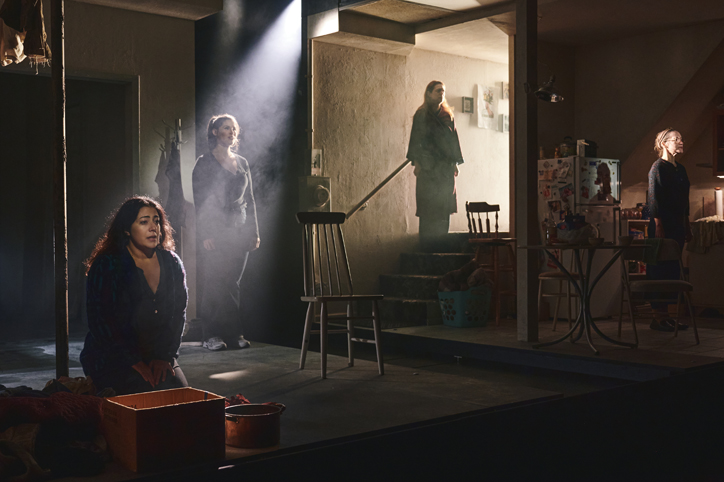
Nadine Malouf, Nicole Villamil, Marin Ireland, Brooke Bloom
Other current occupants include: practical, cynical Pelagiya (Brooke Bloom) from Belarus, Aamani (Nadine Malouf) who has survived trauma in Afghanistan, and, Isabela -an example of undocumented labor (Nicole Villamil.) The latter packs, returning to Honduras to a sick mother and a daughter who may no longer remember her. Renia has seniority of place, collecting rent from the others in the name of the old woman.
“Woman upstairs what owns this building, she says she don’t care how many’s living down here. Just—if we pay: then, okay. Can be three, maybe even four people live here one time. Depends how we want to ehm— // split—“ (Pelagiya)
The company is terrific. Only Nadine Malouf, though dramatically effective, emits less than a believable accent. Standouts include the snappy Brooke Bloom (still waters), colorful Nicole Villamil, and understated Sharlene Cruz.
Solidarity and relationships are communicated in the course of attempting to give Isabela some semblance of a going away party on no money. The women dress (Oh how they dress!) and file out to buy bread and cheese. Four hidden bottles of varied liquor are unearthed, each left by a former tenant, all apparently awful. We learn something about their backgrounds.
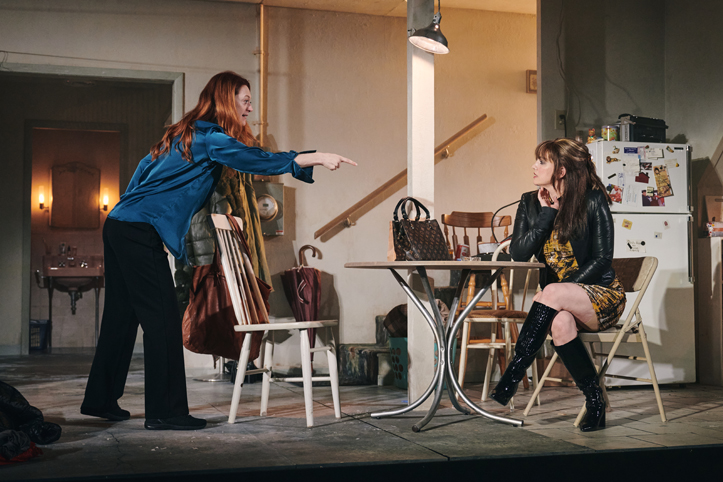
Marin Ireland and Anna Chlumsky (Agata)
Scene two takes place in 2001 when Renia first arrives. She knows how Inna feels in 2017 because she’s been there. The only thing about this remarkable play that doesn’t work smoothly is jerking back and forth too often between then and now. Act II finds us in Ukraine and Queens, both 2017, then 2011.
In Ukraine, we observe how some women hook up with American men just to get here. “…Then you see him. A man… (Sometimes there’s translator. Most times not.) And this man, he say to you something (you have nerves so you don’t maybe understand but you smile) and then he puts out his hand…” Inna arrives this way to unfortunate results.
Brief appearances by relatives of several of the women help fill in back stories. (Anna Chlumsky and Andrea Syglowski) How does someone make her way here? Does America become home? Progeny (Sharlene Cruz) take up residence.
The playwright knows her characters well. Every puzzle piece fits. Dialogue is extraordinary.
Bonds between mothers and daughters run through narrative. Determination for a better life against seemingly insurmountable bigotry, estrangement, and bureaucracy is heart rending and realistic.
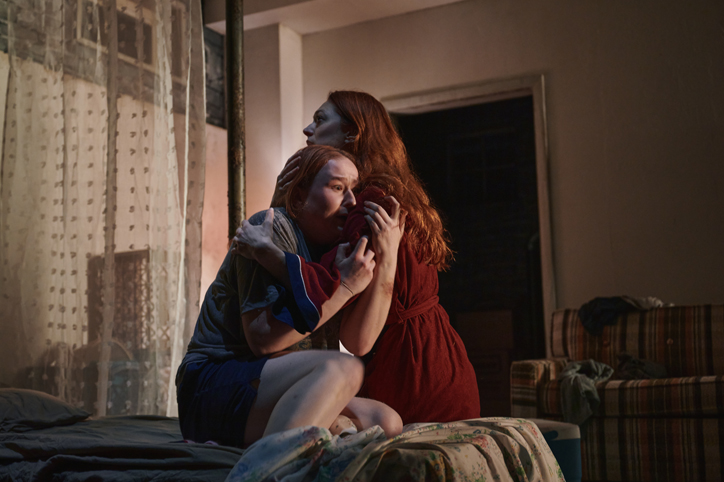
Julia Lester (Inna), Marin Ireland
The biggest secrets lie with Renia whose behavior masks a great deal, both emotionally and pragmatically. When she learns what’s ensued in Warsaw since she left, agony makes her turn on the others.
Director Trip Cullman manifests every aspect of each woman’s character in attitude, speech, bearing, and stage business. Focus is consistent. Pacing feels like real time.
Sarah Laux’s Costumes are marvelous. Bargain bin apparel with a note or two of origin reflect economics and culture.
Photos by Valerie Terranova
Opening: Marin Ireland, Nicole Villamil, Brooke Bloom, Nadine Malouf
A 2017–2018 project titled Real People. Real Lives. documented the experiences of 16 immigrant women in New York, including Queens, through photography and audio interviews. These women spoke candidly about the challenges of housing insecurity, employment discrimination, and gendered labor expectations, while also asserting their agency through community and creative expression.
Queens by Martyna Majok
Directed by Trip Cullman
Manhattan Theatre Club
New York CIty Center Stage I 131 West 55th Street
https://www.manhattantheatreclub.com/

